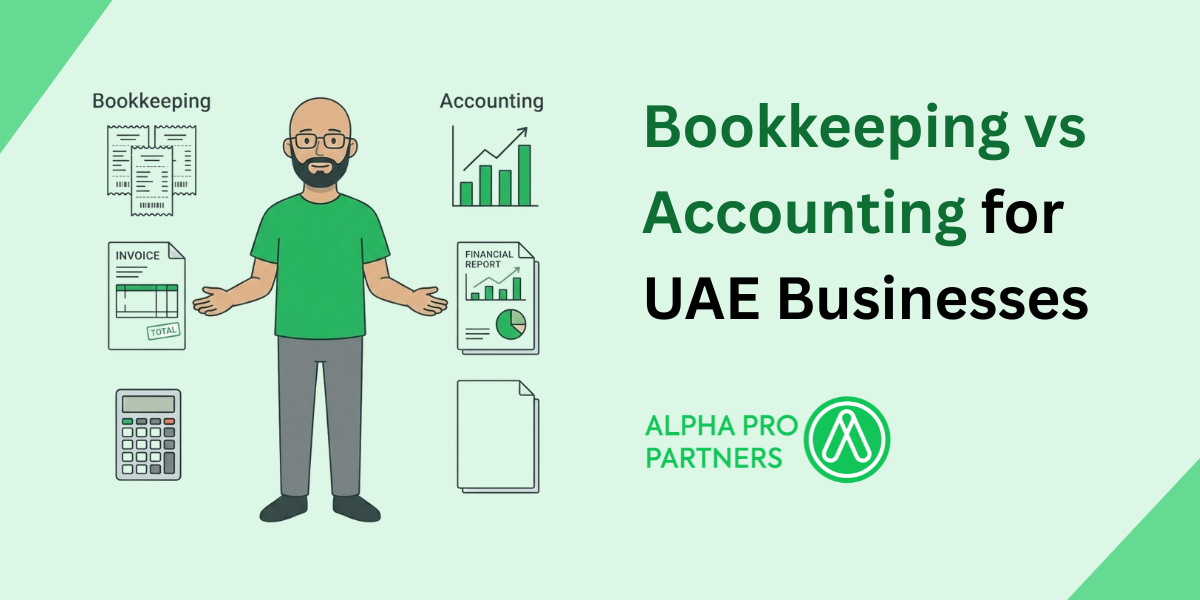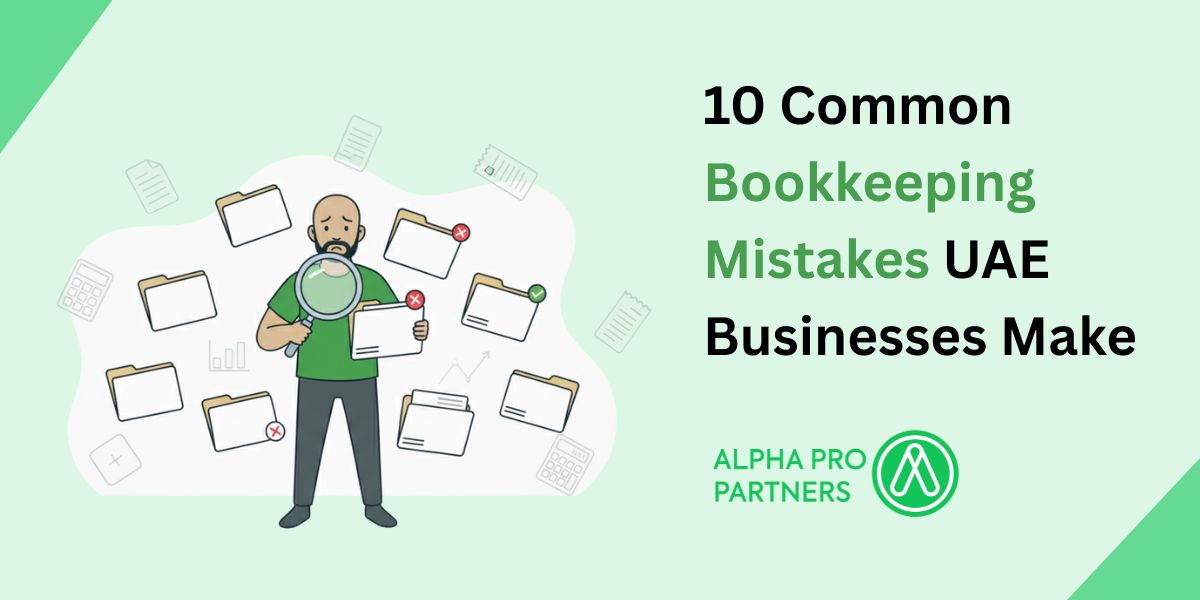UAE Corporate Tax 101: Rates, Filing Deadlines and Relief for Startups and SMEs

Introduction
Corporate tax in the UAE has changed the way businesses operate. While the country remains an attractive hub for entrepreneurs and international investors, companies must now meet new obligations. For start-ups and SMEs in particular, understanding the basics of corporate tax is critical. Getting this right means staying compliant, avoiding penalties, and making better financial decisions.
In this guide, we will cover the essentials of UAE corporate tax. You will learn the rates that apply, deadlines to meet, and the reliefs available for small businesses and new ventures. Along the way, we will also show how proper accounting support and corporate tax services in UAE can simplify compliance and give your business space to grow.
Corporate Tax in the UAE - An Overview
Corporate tax in the UAE was introduced through Federal Decree-Law No. 47 of 2022. It applies to financial years starting on or after June 1, 2023. The law establishes when companies are subject to tax, who is exempt, and how profits are calculated.
The tax is administered by the Federal Tax Authority (FTA), which is also responsible for VAT. This means businesses now deal with the same regulator for both major forms of taxation. The structure is straightforward on the surface, but the rules demand attention to detail and often require guidance from tax consultancy UAE professionals.
Who Needs to Pay Corporate Tax?
Not every entity in the UAE falls under corporate tax. The law identifies taxable persons and exemptions clearly. Broadly, companies incorporated in the UAE or managed from the UAE are subjected to tax. This includes both mainland and Free Zone entities.
However, certain organisations are exempt, such as:
- Government entities
- Wholly government-owned companies
- Qualifying investment funds
- Entities engaged in natural resource extraction (already taxed separately)
For SMEs and start-ups, exemptions are rare, so corporate tax will usually apply.
Corporate Tax Rates in the UAE
The UAE has introduced a tiered rate structure:
- 0 percent on taxable profits up to AED 375,000.
- 9 percent on taxable profits above AED 375,000.
This makes the UAE one of the most competitive jurisdictions globally. For start-ups, the threshold ensures that smaller profits are not taxed, giving breathing space during early stages of growth.
Large multinational groups with consolidated revenues above EUR 750 million face different rules under Pillar Two of the OECD framework, but for most SMEs, the 9 percent standard rate is the relevant figure.
How Taxable Income is Calculated
Calculating Taxable Income
Taxable income is based on accounting profit, adjusted for specific tax rules. This means businesses cannot rely only on their financial statements. Adjustments include removing exempt income, adding back non-deductible expenses, and applying reliefs where available.
Importance of Accurate Records
Maintaining clear accounting records is vital. Errors in classification can increase liability or lead to penalties. Many SMEs rely on outsourced accounting services in the UAE to ensure compliance. Accurate bookkeeping services in Dubai, for example, can help prepare financial statements that align with both accounting standards and tax rules.
Filing Deadlines and Compliance Timeline
Companies must register for corporate tax with the FTA and obtain a Tax Registration Number. Once registered, they must file a return within nine months from the end of their financial year.
For example:
- A business with a financial year ending December 31 must file its return by September 30 of the following year.
- Payment of tax due must be made within the same nine-month period.
Missing these deadlines can result in penalties. The importance of timely filing has pushed many businesses to use cloud accounting services or bundled solutions such as Vat filing services that integrate reminders and automated reporting.
Relief for Small Businesses
The UAE corporate tax framework includes specific relief measures designed for SMEs. One key provision is the Small Business Relief, which allows businesses with revenue below AED 3 million for the relevant tax period to elect this option until the end of 2026.
By choosing this relief, a business will have no corporate tax liability, even if its taxable profits exceed AED 375,000. This measure is designed to ease compliance requirements and support the growth of smaller enterprises
For entrepreneurs, this relief provides an opportunity to focus on growth without the immediate pressure of filing corporate tax returns. However, careful bookkeeping is still required, as the FTA may verify eligibility. Using professional accounting, corporate tax filing services UAE and bookkeeping services in Dubai ensures accurate revenue tracking, which is essential for claiming this relief.
Tax Loss Relief
Not all years will be profitable, especially for start-ups. The UAE system recognises this by allowing businesses to carry forward tax losses. These losses can be used to offset future taxable income, subject to conditions.
This feature helps businesses smooth their tax liabilities over time. It also encourages investment, since companies know that early losses from expansion can provide tax benefits later. Accounting firms in Dubai often guide SMEs on how to record and apply tax losses correctly.
Group Relief and Transfers
Corporate tax law also permits relief within business groups. Under certain conditions, companies with at least 75 percent common ownership can transfer losses to each other or form a tax group. This allows profits and losses to be balanced within the group, reducing overall tax liability.
However, this comes with strict conditions, including consistent financial year-ends and accounting standards. Groups often work with a tax consultancy in the UAE to structure this properly and ensure compliance.
Administrative Obligations and Record Keeping
Corporate tax compliance is not only about filing returns. Businesses must also:
- Maintain proper accounting records for at least seven years.
- Prepare financial statements in line with international standards.
- Ensure transactions with related parties follow transfer pricing rules.
Failure to meet these obligations can lead to penalties even if no tax is due. Outsourced accounting services in the UAE often include ongoing record-keeping support, reducing the risk of errors.
VAT vs Corporate Tax
Some businesses assume that VAT registration means they are covered for all taxes. This is not the case. VAT applies to transactions, while corporate tax applies to profits. Both require separate registration, filing, and compliance.
For SMEs, managing both systems can be overwhelming. Many choose to work with a single accounting services company that offers VAT filing services alongside corporate tax support. This integrated approach saves time and ensures accuracy across both regimes.
Practical Example for Start-ups
Imagine a start-up in Dubai with revenue of AED 2.5 million in its first year. Since this is below the AED 3 million threshold, it qualifies for Small Business Relief and pays no corporate tax for that year. The company still maintains proper accounts using Xero bookkeeping services to ensure compliance.
In the second year, revenue grew to AED 4 million, with profits of AED 500,000. The first AED 375,000 of profit is exempt, and the remaining AED 125,000 is taxed at 9 percent. Proper accounting records ensure the calculation is accurate, and corporation tax filing services handle the return to avoid penalties.
Why Professional Support Matters
Corporate tax is new to the UAE, and rules are still being clarified. For start-ups and SMEs, the challenge is balancing growth with compliance. Working with experienced accounting firms in Dubai provides peace of mind. Services such as bookkeeping for small businesses, Xero accounting services, and tax consultancy UAE ensure that records are accurate and filings are timely.
This professional support not only reduces the risk of errors but also frees entrepreneurs to focus on building their businesses. Many firms also bundle VAT filing services with tax support, making compliance easier across both regimes.
Conclusion
Corporate tax in the UAE has introduced new responsibilities for all businesses. While the system is designed to be simple, startups and SMEs must take care to stay compliant. Reliefs such as the AED 375,000 threshold and Small Business Relief provide significant benefits, but they require accurate records and timely filing.
For many companies, outsourcing accounting services in Dubai is the most practical way to meet these obligations. With the right support, corporate tax becomes a manageable part of doing business in the UAE rather than a barrier to growth.
If you are looking to navigate corporate tax confidently, Alpha Pro Partners can support you with tailored accounting, bookkeeping, and tax compliance solutions that match your business needs.
Frequently Asked Questions
What is the corporate tax rate in the UAE?
The standard rate is 9 percent on taxable profits above AED 375,000. Profits up to AED 375,000 are taxed at 0 percent.
Do all Free Zone companies qualify for 0 percent tax?
No. Only Qualifying Free Zone Persons with approved activities and compliance can benefit. Others pay the standard 9 percent rate.
What is the deadline for filing a corporate tax return?
Companies must file within nine months from the end of their financial year.
Can small businesses avoid paying corporate tax?
Yes. Businesses with revenue under AED 3 million can elect for Small Business Relief until the end of 2026.
How are tax losses treated?
Losses can be carried forward and used to offset future profits, subject to certain limits.
Can group companies share losses?
Yes. Groups with 75 percent common ownership may transfer losses or form a tax group if conditions are met.
Do companies need audited financial statements?
Yes, if they meet thresholds or fall under certain regimes. This confirms compliance with the law.
How is corporate tax different from VAT?
Corporate tax applies to profits, while VAT applies to transactions. Both require separate compliance.
What records must be kept for corporate tax?
Businesses must keep proper accounting records, contracts, and financial statements for at least seven years.
How can Alpha Pro Partners help with corporate tax?
We provide accounting services for small businesses, VAT filing support, bookkeeping solutions, and tax consultancy in the UAE to ensure full compliance with corporate tax obligations.

.webp)





.webp)









.webp)
.webp)


.png)
.png)
.png)
.png)
.png)

.png)
.png)



.png)
.png)





.jpg)


.jpg)





.png)
.png)






.png)


